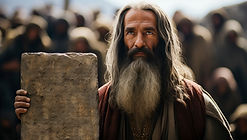
The attached video watching guide is designed to follow the study. Every Scripture I mention is already included in its entirety, but please feel free to take your own notes as you listen and think about what is being said.” - Hal Habecker
LESSON 1: INTRODUCTION
Finishing Well: A Study of Biblical Lives
This study explores the lives of several key biblical characters to examine how they finished their earthly journeys—whether in strength, struggle, or redemption. We look at the Levites, called to lifelong service and holiness, some of whom stayed faithful while others faltered. Naomi's story moves from bitterness to restoration, showing that God can bring renewal even in old age. Joseph, despite betrayal and hardship, remained faithful and finished as a leader who forgave and provided for others. Moses, though denied entry into the Promised Land, finished as a humble servant of God who passed the mantle well. David, a man after God’s own heart, ended his life with repentance and hope for his legacy. Paul, once a persecutor, ran his race with endurance, confident in the crown of righteousness awaiting him. Through these lives, we learn that finishing well isn’t about perfection—it’s about perseverance, faithfulness, and trust in God’s grace until the end.
Hal Habecker introduces a series on aging and fulfilling God's purpose, emphasizing that aging is a meaningful part of God's plan. Hal argues that older people are a valuable resource often ignored by culture citing 2 Timothy 4:6-8 and Psalm 90:12 to underscore the need for wisdom and purpose in aging. Hal encourages continuous service to God, regardless of age, and stresses that retirement does not diminish one's mission. He concludes by urging everyone to live out their calling as effective disciples for Christ.
For our study, we’ll be looking at many characters from the Old Testament and some from the New Testament. The apostle Paul writes this when we think about learning from the Old Testament.
Now these things happened to them as an example, and they were written for our instruction upon whom the ends of the ages have come (1 Corinthians 10.11).
Each of the LESSONS has its own webpage and link for you to share with your friends, family, and social media. You can watch/learn in the series Lessons 1-16 or jump to your favorite characters as Please SHARE.
Enjoy the study, and as always, your feedback and support are appreciated! Tell us more HERE
CHARACTER LESSONS
LESSON 2: Levites
Hal Habecker discusses the biblical perspective on retirement, focusing on the Levites who retired at age 50 to serve in 48 cities across Israel. Despite the modern concept of retirement being less than a century old, Habecker emphasizes that the Bible addresses it implicitly. He highlights the Levites' post-retirement roles as pastors, judges, and teachers, stressing their continued contribution to the community. Habecker argues that older people, like the Levites, should remain active in their faith, mentoring younger generations and fulfilling God's purpose. He encourages continuous growth and service in all stages of life, advocating for a multi-generational approach to ministry.
LESSON 3: Simeon & Anna
Simeon and Anna, two biblical figures who exemplify living well in old age. Simeon, described as righteous and devout, was anticipating the Messiah and was assured by the Holy Spirit that he would not die until he saw the Lord's Christ. Upon meeting Jesus, he blessed God and was ready to die in peace. Anna, a widow for 84 years, dedicated her life to fasting, praying, and serving in the temple, and recognized Jesus as the Messiah. Both Simeon and Anna lived their lives in anticipation of Jesus' mission and message, offering lessons in faithfulness and devotion to the end.
LESSON 4: Naomi
The biblical story of Naomi and Ruth, emphasizing how Naomi, despite facing significant hardships including the deaths of her husband and sons, and feeling abandoned by God, ultimately finishes her life well. Naomi's story illustrates the importance of trusting in God's sovereignty and living obediently. Ruth's unwavering loyalty to Naomi and her eventual marriage to Boaz, who becomes her protector and provider, leads to the birth of Obed, the grandfather of King David. Habecker highlights the significance of finishing well, trusting in God's plan, and the importance of community and faithfulness.
LESSON 5: Joseph
Discussing the life of Joseph in Genesis, emphasizing his faithfulness and the lessons it offers for aging well. Joseph, the 12th son of Jacob, faced sibling jealousy and was sold into slavery in Egypt. Despite hardships, he remained faithful, rising to become Pharaoh's right-hand man during seven years of plenty and seven years of famine. Joseph reunited with his brothers, forgave them, and ensured his family's well-being. He lived to 110, caring for his father and family, and ensured his burial plans were in order. Habecker encourages embracing faithfulness and planning for the future, leaving a legacy of hope and trust in God.
LESSON 6: Gideon
Hal Habecker discusses the biblical character Gideon, emphasizing lessons on aging and faith. Gideon initially doubts God's choice but eventually leads the Israelites to victory against the Midianites with only 300 men. Despite his initial faith, Gideon's actions later lead to idolatry, as he creates an ephod from gold earrings. His son Abimelech, named "my father is king," fulfills Gideon's unspoken desire for kingship, leading to chaos and his own downfall. Habecker urges maintaining faithfulness and wisdom in aging, highlighting the importance of long-term decision-making and spiritual growth.
LESSON 7: Joshua
The biblical character Joshua, emphasizing his leadership and faith. Joshua, from the tribe of Ephraim, was chosen as one of the 12 spies to explore the Promised Land. Despite the Israelites' fear, Joshua and Caleb remained confident in God's promise. Joshua served as Moses' understudy for 40 years, learning leadership amidst rejection. At 80, he led Israel into the Promised Land, urging obedience to God's laws. Habecker highlights the importance of faith, mentorship, and leadership in old age, encouraging listeners to serve God courageously and to pass on their faith to future generations.
LESSON 8: David
Hal Habecker reflects on the lessons from David's life, emphasizing the importance of finishing well. He discusses David's list of 30 friends who shaped his life and the significance of maintaining connections. Habecker highlights David's sin of numbering Israel, which led to a pestilence and 70,000 deaths, and his subsequent repentance. He also addresses David's failure to name Solomon as his successor, leading to Adonijah's proclamation as king. Habecker stresses the need for accountability, planning for future generations, and continuous worship. He concludes by encouraging listeners to learn from David's mistakes and strive to finish their lives well.
LESSON 9: Eli
The biblical story of Eli, highlights the contrast between Eli and his successor, Samuel. Eli's failure to discipline his wicked sons, Hophni and Phinehas, led to their downfall and the loss of the Ark of the Covenant to the Philistines. Eli's inaction resulted in God's judgment on his house. Habecker emphasizes the importance of family over ministry, quoting Psalm 90:12 to stress the need for wisdom in aging and family life. He urges listeners to learn from Eli's mistakes and prioritize their families in their service to God.
LESSON 10: Jehoiada
Hal Habecker discusses the biblical characters Jehoiada and Jehoshabeth, who hid and raised King Joash, the son of the evil King Jehoram. Despite their advanced ages, Jehoiada and Jehoshabeth dedicated their later years to God's service, raising Joash in secrecy until he became king. Joash initially followed their guidance but later turned away from God, leading to tragic consequences, including the murder of Jehoiada's son Zechariah. Habecker emphasizes the importance of maintaining a clear vision of God and finishing well, urging listeners to emulate Jehoiada and Jehoshabeth's dedication.
LESSON 11: Daniel
Hal Habecker discusses the life of Daniel, emphasizing his faithfulness and dedication to God. Daniel, captured at 16, refused to defile himself and was favored by God. He served under Babylonian rulers for 65 years, demonstrating wisdom and boldness in proclaiming God's word. Despite facing threats, including being thrown into a lion's den, Daniel remained steadfast in prayer. His later years were marked by intense prayer, seeking God's guidance. Habecker highlights Daniel's example of finishing well, urging listeners to serve God faithfully regardless of their circumstances and to pray fervently, especially in their later years.
LESSON 12: Peter & John
Hal Habecker discusses the lives of Peter and John, two of Jesus' disciples, emphasizing their commitment to serving God throughout their lives. He highlights their initial call as fishermen and their transformation into "fishers of men." Peter's brashness and eventual growth, including his denial of Jesus and subsequent leadership in the early church, are noted. John's later writings, including the Gospel of John and the epistles, are also discussed, underscoring the importance of finishing well and staying faithful. Habecker encourages listeners to seek mentorship, remain active in faith, and strive for personal growth and service to the end of their lives.
LESSON 13: Moses
The biblical character Moses and his life lessons on aging and finishing well. Hal highlights Moses' special birth, protection, and upbringing in Pharaoh's house, and his later actions, including striking an Egyptian and fleeing to Midian. Moses' 40-year wilderness journey, where he met his wife and worked as a shepherd, is recounted. Despite his failures, such as striking the rock twice, Moses continued to fulfill God's purpose. Habecker emphasizes the importance of aligning one's life with God's plan, learning from past mistakes, and mentoring future generations. Moses' final days and legacy are also touched upon, encouraging intentional living and trust in God's promises.
LESSON 14: Hezekiah
What would we do with 15 years if God added them to our lives? Would we live them for ourselves or would we live those extra years for God? Hezekiah's son Manasseh was born during these extra 15 years, yet grew up to be one of Judah's most wicked kings. This suggests that Hezekiah failed to invest spiritually in his son during his extended years.
LESSON 15: Paul
Hal Habecker discusses the Apostle Paul as a model for finishing life well, emphasizing Paul's journey from persecutor to missionary. Paul's conversion on the road to Damascus marked the beginning of his mission, which included three missionary trips and significant writings. Despite facing persecution and imprisonment, Paul pressed on, focusing on his faith and mission. His final letters, particularly 2 Timothy, reflect his readiness for death and his commitment to Christ. Habecker encourages listeners to live intentionally, like Paul, and to number their days wisely, aiming to present a heart of wisdom to God.
Watch the Trailer
LESSON 16: Closing Thoughts
Hal Habecker concludes his series on finishing well by emphasizing the importance of living each day well to ensure a fulfilling end of life. He encourages listeners to learn from biblical characters, start a mental or written notebook on how people finish their lives, and make a commitment to finish well. Habecker advises applying scriptures to aging, seeking God's kingdom, and knowing one's purpose in life. He suggests creating a 25-year game plan and anticipating the future, inspired by a personal story of a woman singing "This is the day the Lord has made." Habecker also recommends resources like "Finishing Well" ministries for further guidance.


















